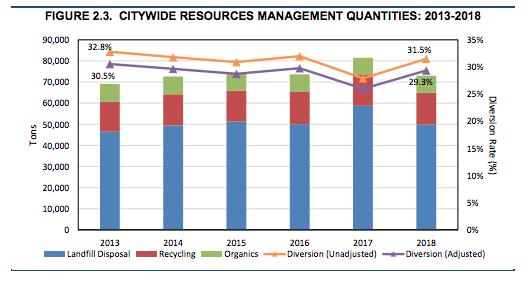Kristy Jones
Each year the Campus Race to Zero Waste (formerly RecycleMania) program calls for best practice case studies from campuses across the U.S. and Canada to showcase programs and strategies in waste minimization, food waste reduction, and education and awareness. The case study resource is a great opportunity to gain recognition for campus efforts to reduce waste and to share helpful information for campuses that are working on similar efforts. The University of Michigan entered a case study into the competition, but didn’t earn a spot among the winners. Nonetheless, U-M’s study did submit a case study showcasing efforts to educate its faculty, staff and students on the merits of waste zero.
Winners are recognized in four categories: waste minimization, food waste reduction, education and awareness, and a summary of waste minimization efforts over a year or more. Judging is based on criteria including creativity, transferability (how easily could the initiative be replicated), and measurable impact.
Despite the challenges campuses faced this year due to COVID-19 including increased safety policies and online learning schedules, students, faculty and staff continued their efforts to advance waste minimization and zero waste efforts on campus. Many campuses increased their social media presence, launched digital education and awareness campaigns, and also started to think ahead to ensure they could hit the ground running in the fall to refresh and restart sustainability efforts that had been put on hold due to the pandemic. Efforts to increase the use of reusable items such as beverage containers and reusable clamshells for food take-out, and encouraging reusable masks, are just a few examples.
These are the winners:
Waste Minimization Winner:
- Lehigh University (Pennsylvania) – Reduces the use of, and waste from, disposable clamshell take-out containers on campus through its ecocontainer effort.
Food Waste Reduction:
- Indiana University Purdue University – Launches Riverwalk Composting Pilot Program, a student‐led initiative focused on empowering residents at Riverwalk Apartments to compost their food waste.
Education and Awareness:
- Dallas College (Texas) – Promotes zero waste with an online Zero Waste Education Hub, and modeled Zero Waste Practices in Arts, Construction and Public Health.
- Towson University (Maryland) receives an Honorable Mention – Hosts social media education and awareness campaigns focused on waste reduction and avoidance best practices, with an emphasis on food waste and wasted food.
Here is a link to the University of Michigan’s case study entry: University of Michigan engages staff and students working and studying both on campus and remotely using weekly feedback, themes, challenges, and activities throughout the competition to encourage waste reducing behaviors.
According to the case study, “The campus diversion rate during the 8 weeks of the competition was 12 percent higher as compared to the previous fiscal year’s diversion rate. Sixty‐five individual buildings participated in the campus “U‐M Edition” of the competition. From this, we can assume much of the building staff received the weekly theme emails and communication and engaged in the suggested
activities.”
According to data from the University Michigan Office of Sustainability, the university has a goal of reducing the waste sent to landfills by 40 percent by 2025. Thus far, the university has reduced its waste sent to landfills by 17 percent.

How much waste does the University of Michigan send to landfills annually? Again according to data provided by the U-M Office of Sustainability, the institution has reduced the waste it landfills from 14,000 tons to 11,000 tons. By comparison, Ohio State University has set a goal of diverting 90 percent of the waste that university produces from landfills by 2025. UC-Berkeley presently diverts 60 percent of its waste from landfills.
If the University of Michigan is dragging its proverbial bins in efforts to cut its waste to zero, despite having spent over $100,000,000 on solid waste, and recycling over the past six years, Ann Arbor’s recycling rates have remained relatively unchanged (graph below). According to the City’s most recent Solid Waste Management Plan, “Total solid waste program tonnages have been fairly consistent from year to year over the prior planning period, with the City managing approximately 73,000 tons annually through its collection and disposal / diversion programs.” The plan goes on to point out: “Additionally, the quantity of materials managed through each of the solid waste resources management methods (recycling, composting, landfill disposal) and corresponding diversion rates have also been consistent over this period.”

Ann Arbor’s 55 percent diversion rate pales in comparison to the rates in other college towns. The City of Berkeley has an overall 82 percent diversion rate, and Madison’s diversion rate is almost 70 percent.
Ann Arbor’s billion dollar A2Zero Plan is not about zero waste. That plan predicts that “by 2022, year round and commercial composting has led to over 5,000 tons of yard and food waste being diverted from our waste stream annually.” Like the University of Michigan, the City of Ann Arbor has no plan to reach Zero Waste anytime soon.


Comments are closed, but trackbacks and pingbacks are open.